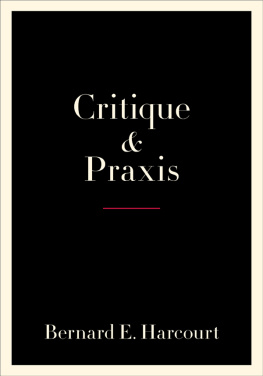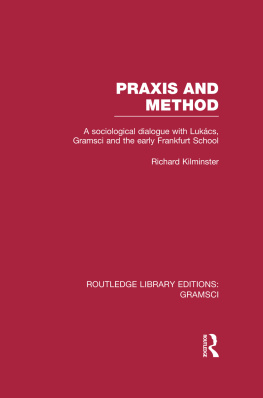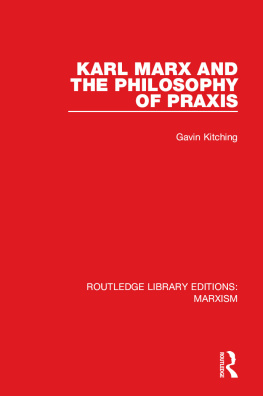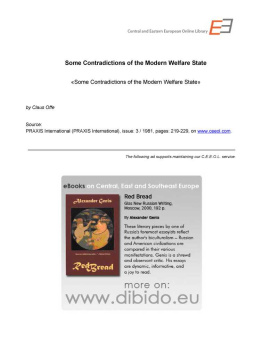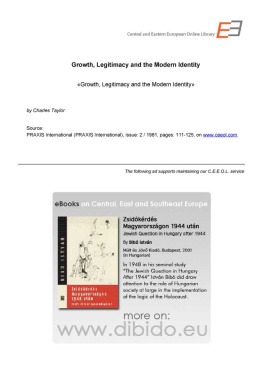Table of Contents
Critique & Praxis
Critique
&
Praxis
A Critical Philosophy of Illusions, Values, and Action
Bernard E. Harcourt
Columbia University Press
New York
Columbia University Press
Publishers Since 1893
New York Chichester, West Sussex
cup.columbia.edu
Copyright 2020 Bernard E. Harcourt
All rights reserved
E-ISBN 978-0-231-55145-8
Library of Congress Cataloging-in-Publication Data
Names: Harcourt, Bernard E., 1963- author.
Title: Critique and praxis / Bernard E. Harcourt.
Description: New York: Columbia University Press, [2020] |
Includes bibliographical references and index.
Identifiers: LCCN 2019049171 (print) | ISBN 9780231195720 (hbk) |
ISBN 9780231551458 (ebk)
Subjects: LCSH: Critical theory. | Political sciencePhilosophy. |
Political participation. | Social action.
Classification: LCC HM480 .H37 2020 (print) | LCC HM480 (ebook) |
DDC 142dc23
LC record available at https://lccn.loc.gov/2019049171
LC ebook record available at https://lccn.loc.gov/2019049172
A Columbia University Press E-book.
CUP would be pleased to hear about your reading experience with this e-book at .
Cover design: Lisa Hamm
Contents




T o change the world: The ambition of critical philosophy since its inception in the nineteenth century has always been to transform human existence. Not just to make the world more safe and secure for private possessions or for the free pursuit of self-interest, as Thomas Hobbes, John Locke, or Adam Smith aspired to earlier. Not just to make it more rational, self-conscious, or orderly, with Immanuel Kant, G. W. F. Hegel, or Max Weber. Nor simply to make men more virtuous or life more pleasurable, as Aristotle, Epicurus, Seneca, and the ancients envisaged millennia before. But rather, to create a more just and equal society, with less domination and social differential, and to materialize the opportunity for each and every one of us to flourish and achieve our greatest potential. To realize a world of equal citizens, in which all human beings can fulfill their talents and aspirations, in which all are nurtured, educated, and cared for generously and respectfully by each other, tending not only to their dreams and ambitions, but also humbly to everyone elses.
The philosophers have only interpreted the world, in various ways, Karl Marx wrote in his notebooks in 1845, the point, however, is to change it. These now-famous words sealed the birth certificate of critical philosophy, although many had foreshadowed it earlier, including Jean-Jacques Rousseau, the Levellers, Saint Francis, or even, on some readings, the prophetic traditions long before. What they all sharedand would share with later critical theorists such as Max Horkheimer, Michel Foucault, Angela Davis, Judith Butler, and Gayatri Chakravorty Spivakwas the ambition to infuse the world with the values of compassion, equality, solidarity, autonomy, and social justice. To turn the contemplative philosophical tradition into a practice of emancipation. To push thought in the direction of action and toward human liberation. To convert theory into practice.
From antiquity, philosophers had conceived of the twotheory and practiceas two fundamentally different ways of living, different ways of being human. The ancient Greeks referred to them as theoria, meaning contemplation, and praxis, the ethical and political form of being. The former, theoria, predominantly involved understanding and comprehensionin essence, knowing. It was oriented toward wisdom. The latter, praxis, revolved around activity, action, performancein essence, doing. It was geared toward proper behavior in ethical and political life. For the ancients, these represented two different modes of engaging the worldtwo among others, poiesis, or artistic creation, being another.
These categories helped shape human experience ever since. They entered our common lexicon and structured our way of being.
Philosophers, almost by definitionby the very etymology of their creed as lovers of wisdomnaturally tended to favor theory, contemplation, and inquiry over action. This orientation traced far back in history. In the First Alcibiades and Platos Statesman, Socrates reenacted the age-old preference for knowledge over practice. Confronting young men who wanted to live the life of praxis rather than contemplation, Socrates quickly made them realize that they did not actually know that much about doing justice or governing others, and that they first needed to gain knowledge. Socrates convinced them to know themselves first, giving philosophical expression to the ancient Delphic maxim gnthi seauton, know thyself. Politics in practice, it turns out, is a skill that requires a techn, a technique, a craftsmanshipa set of knowledges. Like the captain of a ship or the shepherd of a flock, the political practitioner must first acquire knowledge. There are skills to be learned and knowledge to be had. There must be wisdom firstwhich, naturally, pushed the inquiry back to the realm of contemplation. It returned the young men of praxis to Socrates discussion of justice from the Republic. Praxis, it turns out, must defer to true wisdom.
The second thesis: The question whether objective truth can be attributed to human thinking is not a question of theory but is a practical question. The eighth: Social life is essentially practical. And, then, of course, the eleventh.
With his bold language and clear vision, Marx epitomized the critical turn in philosophy. It was at the heart of his philosophical and personal quest for human emancipation, above and beyond simply ensuring civil and political rights. It was the basis, first, of Marx turning idealism into materialism so that the motor of history would no longer be the evolution of reason or the rationalization of society, but rather the material contradictions in capitalism that would ultimately lead to the emancipation of all women and men; and second, of his turning classical political economy into an analysis of the crises of capital accumulation. In both periods, the young and the mature Marx inaugurated a critical turn in philosophy by attempting to convert the contemplative tradition into a practice of emancipation.
The object of critical philosophy is not simply the theory of emancipation, Horkheimer emphasized in 1937; it is the practice of it as well.
Yet a series of historical setbacks, failures, and catastrophes during the twentieth century led critical philosophy to beat retreat from its practical ambitions. These seismic shifts in historythe rise of fascism and the Holocaust, the gulag archipelago and collapse of Soviet communism, the eclipse of the student and worker revolts of May 1968, the hegemonic emergence of global neoliberalismall chastened the critical impulse and pushed critical theory into a safer, epistemological direction. Safer, at least, for philosophers and critical thinkers. Critical theory took an epistemological detour and moved away from praxis.









